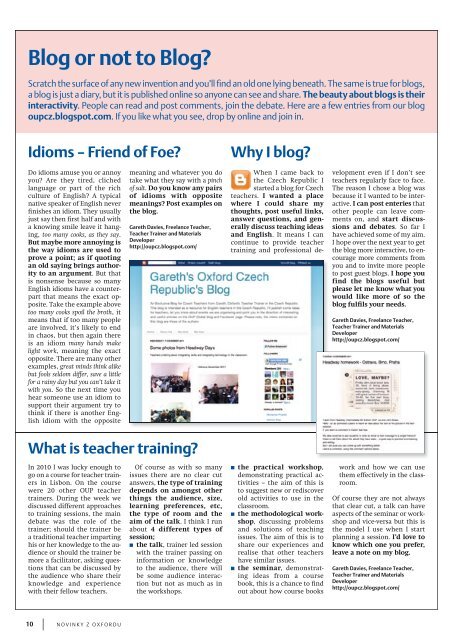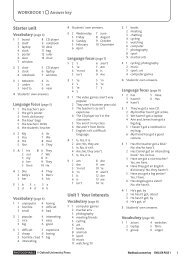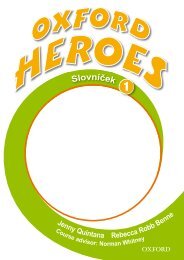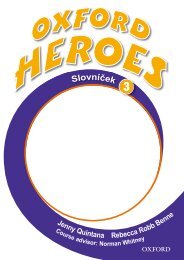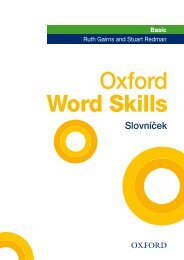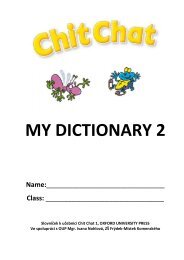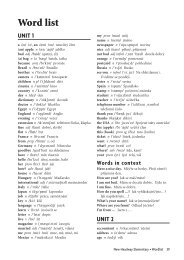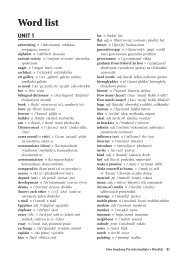You also want an ePaper? Increase the reach of your titles
YUMPU automatically turns print PDFs into web optimized ePapers that Google loves.
Blog or not to Blog?<br />
Scratch the surface of any new invention and you’ll fi nd an old one lying beneath. The same is true for blogs,<br />
a blog is just a diary, but it is published online so anyone can see and share. The beauty about blogs is their<br />
interactivity. People can read and post comments, join the debate. Here are a few entries from our blog<br />
oupcz.blogspot.com. If you like what you see, drop by online and join in.<br />
Idioms – Friend of Foe?<br />
Do idioms amuse you or annoy<br />
you? Are they tired, cliched<br />
language or part of the rich<br />
culture of English? A typical<br />
native speaker of English never<br />
fi nishes an idiom. They usually<br />
just say then fi rst half and with<br />
a knowing smile leave it hanging,<br />
too many cooks, as they say.<br />
But maybe more annoying is<br />
the way idioms are used to<br />
prove a point; as if quoting<br />
an old saying brings authority<br />
to an argument. But that<br />
is nonsense because so many<br />
English idioms have a counterpart<br />
that means the exact opposite.<br />
Take the example above<br />
too many cooks spoil the broth, it<br />
means that if too many people<br />
are involved, it’s likely to end<br />
in chaos, but then again there<br />
is an idiom many hands make<br />
light work, meaning the exact<br />
opposite. There are many other<br />
examples, great minds think alike<br />
but fools seldom differ, save a little<br />
for a rainy day but you can’t take it<br />
with you. So the next time you<br />
hear someone use an idiom to<br />
support their argument try to<br />
think if there is another English<br />
idiom with the opposite<br />
In 2010 I was lucky enough to<br />
go on a course for teacher trainers<br />
in Lisbon. On the course<br />
were 20 other OUP teacher<br />
trainers. During the week we<br />
discussed different approaches<br />
to training sessions, the main<br />
debate was the role of the<br />
trainer; should the trainer be<br />
a traditional teacher imparting<br />
his or her knowledge to the audience<br />
or should the trainer be<br />
more a facilitator, a<strong>sk</strong>ing questions<br />
that can be discussed by<br />
the audience who share their<br />
knowledge and experience<br />
with their fellow teachers.<br />
10 NOVINKY Z OXFORDU<br />
meaning and whatever you do<br />
take what they say with a pinch<br />
of salt. Do you know any pairs<br />
of idioms with opposite<br />
meanings? Post examples on<br />
the blog.<br />
Gareth Davies, Freelance Teacher,<br />
Teacher Trainer and Materials<br />
Developer<br />
http://oupcz.blogspot.com/<br />
What is teacher training?<br />
Of course as with so many<br />
issues there are no clear cut<br />
answers, the type of training<br />
depends on amongst other<br />
things the audience, size,<br />
learning preferences, etc,<br />
the type of room and the<br />
aim of the talk. I think I run<br />
about 4 different types of<br />
session;<br />
■ t h e t a l k , trainer led session<br />
with the trainer passing on<br />
information or knowledge<br />
to the audience, there will<br />
be some audience interaction<br />
but not as much as in<br />
the workshops.<br />
Why I blog?<br />
When I came back to<br />
the Czech Republic I<br />
started a blog for Czech<br />
teachers. I wanted a place<br />
where I could share my<br />
thoughts, post useful links,<br />
answer questions, and generally<br />
discuss teaching ideas<br />
and English. It means I can<br />
continue to provide teacher<br />
training and professional de-<br />
■ the practical workshop,<br />
demonstrating practical activities<br />
– the aim of this is<br />
to suggest new or rediscover<br />
old activities to use in the<br />
classroom.<br />
■ the methodological workshop,<br />
discussing problems<br />
and solutions of teaching<br />
issues. The aim of this is to<br />
share our experiences and<br />
realise that other teachers<br />
have similar issues.<br />
■ the seminar, demonstrating<br />
ideas from a course<br />
book, this is a chance to fi nd<br />
out about how course books<br />
velopment even if I don’t see<br />
teachers regularly face to face.<br />
The reason I chose a blog was<br />
because it I wanted to be interactive.<br />
I can post enteries that<br />
other people can leave comments<br />
on, and start discussions<br />
and debates. So far I<br />
have achieved some of my aim.<br />
I hope over the next year to get<br />
the blog more interactive, to encourage<br />
more comments from<br />
you and to invite more people<br />
to post guest blogs. I hope you<br />
find the blogs useful but<br />
please let me know what you<br />
would like more of so the<br />
blog fulfi ls your needs.<br />
Gareth Davies, Freelance Teacher,<br />
Teacher Trainer and Materials<br />
Developer<br />
http://oupcz.blogspot.com/<br />
work and how we can use<br />
them effectively in the classroom.<br />
Of course they are not always<br />
that clear cut, a talk can have<br />
aspects of the seminar or workshop<br />
and vice-versa but this is<br />
the model I use when I start<br />
planning a session. I’d love to<br />
know which one you prefer,<br />
leave a note on my blog.<br />
Gareth Davies, Freelance Teacher,<br />
Teacher Trainer and Materials<br />
Developer<br />
http://oupcz.blogspot.com/


